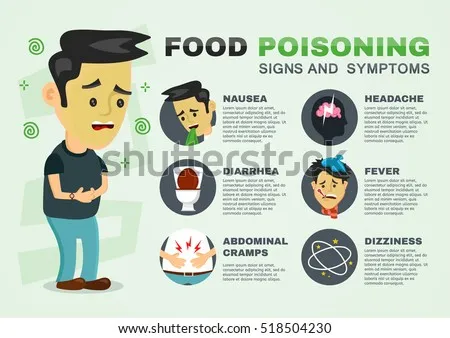
Symptoms of Poisoning
Poisoning
Is the entry of any foreign substance harmful to the body and cause damage in it, and be in certain quantities.
Methods of entering toxic substances into the body

• Through the nose: through the inhalation of some harmful substances, such as odors of gases.
• Oral: The toxic substances are taken orally, whether as a beverage or as solids such as detergents, spoiled foods and medicines.
• By the skin: where harmful chemicals are absorbed through the skin when touched like insecticides.
• Injections: The toxin is injected directly into the blood, such as drug poisoning.
• By sting and biting: like snakes bites and scorpions.
Symptoms and signs of poisoning

Symptoms associated with poisoning vary depending on the type of toxic substances that have entered the body, but some signs and symptoms may appear, such as:
• The incidence of sudden and strange nerve, or loss of control and delirium, and these symptoms are often accompanied by toxic substances that enter the blood or circulation directly.
• Suffocation of the suffocation where some toxins when they reach the blood by separating the atoms of oxygen from the blood and linked to place.
• The feeling of large abdominal pain accompanied by cases of diarrhea and vomiting, and increased sweating in the body, and this is accompanied by toxic substances that enter through the mouth to infect the digestive system.
• Unconsciousness.
• The presence of traces of burns around the mouth or smells visible in the case of the use of toxic or incendiary substances. A small hole in the skin or traces of teeth, so when the sting or biting poisoning.

The most common type of poisoning is food poisoning. It is a condition that the patient feels after eating contaminated food. It is usually treated within three days. Symptoms appear within hours after eating or may appear after several days. Symptoms are diarrhea , Vomiting, loss of appetite with a feeling of abdominal pain.
Methods of providing first aid in case of poisoning

• Contact the specialized civil defense team immediately.
• Make sure the patient is breathing, and try to give him artificial respiration if his breathing is weak or unconscious.
• If the cause of poisoning is the use of chemicals, the patient may be given a cold milk or drinking water, and the person should not be forced to vomit, because the chemical returns to the respiratory tract and may cause combustion and damage.
• If the cause of poisoning is taking medicines, it is best to vomit the injured, by giving him a glass of water dissolved in two tablespoons of salt.
• If the cause of the poisoning is contact with chemicals for the skin at first it must be wiped from the skin to prevent the leakage of more quantities to it.

By Sanaa Dwik